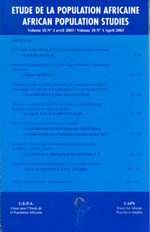
|
African Population Studies
Union for African Population Studies
ISSN: 0850-5780
Vol. 19, No. SB, 2004, pp. 31-59
|
 Bioline Code: ep04034
Bioline Code: ep04034
Full paper language: English
Document type: Research Article
Document available free of charge
|
|
|
African Population Studies, Vol. 19, No. SB, 2004, pp. 31-59
| en |
The Social and Economic Implications of HIV/AIDS
Gaigbe-Togbe, Victor & Weinberger, Mary Beth
Abstract
The paper reviews the state of knowledge on the demographic and socio-economic impacts of AIDS. It shows that HIV/AIDS has been taking a devastating toll on human lives. Life expectancy has already fallen by more than 10 years in the most affected countries. Households are feeling the impact of AIDS in terms of loss of earnings and increased expenditure for medical care. As a result of HIV/AIDS, food consumption is decreasing in many AIDS-affected households, leading to malnutrition, especially among young children. The HIV/AIDS epidemic is also imposing serious costs on the private sector in the most affected countries. AIDS deaths reduce the number of available workers, since the deaths occur predominantly among workers in their most productive years. The available evidence points to an impact of the epidemic on the labour costs and productivity of most firms depending on the skills of those who are affected and whether they are replaceable or not. HIV/AIDS is also having a dramatic impact on the agricultural sector, partly because the great majority of the infected population in the most affected countries lives in rural areas. The health and education sectors are also feeling the impact of HIV/AIDS. Children in AIDS-affected households are often taken out of school. Deaths and illnesses have also affected education-sector administrators and teachers resulting in a reduction in the supply of educational services and an increase of educational system costs. The health sector in the most affected countries is also witnessing a shortage of health professionals and an increase in the demand for health care. Finally, while there seems to be less agreement among economists about the impact of HIV/AIDS on the growth of GDP per capita at the present time, the impact of HIV/AIDS on the economy and development is likely to intensify in the near future. The longer-term economic effects resulting from lower investment in human capital - especially the education, health and nutrition of future workers - may be severe.
|
| |
© Copyright 2004 - Union for African Population Studies
Alternative site location: http://www.uaps-uepa.org
|
|
